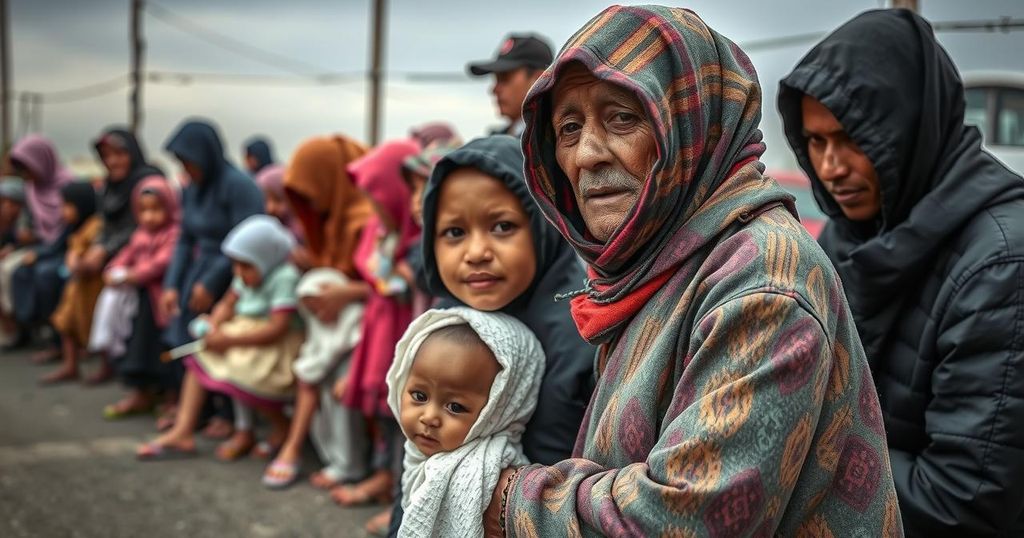World news
AFRICA, AMERICA, ANDREW HARPER, CLIMATE CHANGE, FILIPPO GRANDI, GODDARD INSTITUTE FOR SPACE STUDIES, GRANDI, HINDU, HUMANITARIAN AID, INTERNALLY DISPLACED PERSONS (IDPS, MYANMAR, NATIONAL OCEANIC AND ATMOSPHERIC ADMINISTRATION, NATURAL DISASTERS, SARAH KAPNICK, SOMALIA, SUDAN, UN, UNHCR
Jamal Robinson
0 Comments
UN Refugee Report Highlights Urgent Climate and Conflict Nexus
The UNHCR warns that refugees are increasingly impacted by climate change and violent conflicts, with unprecedented displacement figures. The report indicates inadequate funding for adaptation, highlighting the urgent need for global action and support for affected communities.
A recent report from the United Nations High Commissioner for Refugees (UNHCR) presents a grave warning about the precarious conditions faced by refugees amid the intertwining crises of climate change and violent conflict. In regions such as Sudan, Somalia, and Myanmar, extreme weather events like floods and droughts exacerbate existing conflicts, forcing individuals to flee their homes. UNHCR chief Filippo Grandi emphasized that these individuals are at the epicenter of a climate crisis, with 75% of refugees residing in developing nations exposed to severe climate risks.
Funding for adaptation in these vulnerable states remains dismally low, at approximately $2 per person annually, in stark contrast to the $161 allocated per person in more resilient countries. This lack of resources is particularly alarming as the number of forcibly displaced individuals reaches a record 120 million due to conflict, alongside another 220 million displaced by weather-related disasters. The urgency of the situation has been magnified by the unprecedented temperatures recorded this year, marking 2023 as the hottest year on record.
Living conditions for refugees in low-income countries are deteriorating, as they are increasingly forced into areas with harsh environmental conditions, including deserts and flood-prone regions lacking adequate infrastructure. Andrew Harper, UNHCR’s special advisor on climate action, noted that the already dire situations faced by refugees are becoming more untenable. The international community’s response includes pledges made at COP29 in Baku, where nations committed to earmarking $300 billion for vulnerable countries by 2035, in addition to a broader goal of raising $1.3 trillion through private sector investment.
UNHCR aims to protect the most vulnerable refugees and transition to sustainable services by 2030. Najeeba Wazefadost of Refugees for Climate Action stressed the need for world leaders to listen to refugees’ experiences and take decisive, inclusive action to support resilience and empower refugee-led solutions.
The interrelationship between climate change and forced displacement has gained prominence as a crucial global issue. Climate shocks, which include extreme weather conditions, have been increasingly identified as key factors driving people from their homes, often exacerbated by ongoing conflicts. This nexus creates complex humanitarian challenges requiring urgent attention and funding. The UNHCR’s latest report sheds light on the dire circumstances faced by forcibly displaced individuals, emphasizing the need for collective global action to address their plight effectively.
In summary, the UNHCR report highlights the escalating crises of climate change and conflict as significant contributors to the growing refugee crisis globally. With an alarming number of people forcibly displaced and insufficient funding for adaptation in vulnerable regions, nations must act swiftly and decisively to provide support. This dual challenge necessitates an inclusive approach that prioritizes refugee-led solutions and sustainable development to ensure the protection and dignity of those most affected by these crises.
Original Source: www.thecooldown.com




Post Comment